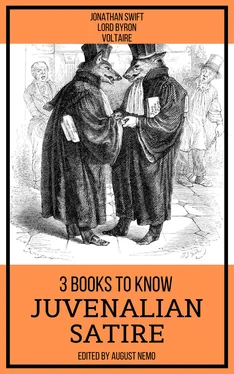Palace, or garden, paradise, or cavern,
Which serves the happy couple for a tavern.
That is the usual method, but not mine—
My way is to begin with the beginning;
The regularity of my design
Forbids all wandering as the worst of sinning,
And therefore I shall open with a line
(Although it cost me half an hour in spinning)
Narrating somewhat of Don Juan's father,
And also of his mother, if you 'd rather.
In Seville was he born, a pleasant city,
Famous for oranges and women—he
Who has not seen it will be much to pity,
So says the proverb—and I quite agree;
Of all the Spanish towns is none more pretty,
Cadiz perhaps—but that you soon may see;
Don Juan's parents lived beside the river,
A noble stream, and call'd the Guadalquivir.
His father's name was Jose—Don, of course,—
A true Hidalgo, free from every stain
Of Moor or Hebrew blood, he traced his source
Through the most Gothic gentlemen of Spain;
A better cavalier ne'er mounted horse,
Or, being mounted, e'er got down again,
Than Jose, who begot our hero, who
Begot—but that 's to come—Well, to renew:
His mother was a learned lady, famed
For every branch of every science known
In every Christian language ever named,
With virtues equall'd by her wit alone,
She made the cleverest people quite ashamed,
And even the good with inward envy groan,
Finding themselves so very much exceeded
In their own way by all the things that she did.
Her memory was a mine: she knew by heart
All Calderon and greater part of Lope,
So that if any actor miss'd his part
She could have served him for the prompter's copy;
For her Feinagle's were an useless art,
And he himself obliged to shut up shop—he
Could never make a memory so fine as
That which adorn'd the brain of Donna Inez.
Her favourite science was the mathematical,
Her noblest virtue was her magnanimity,
Her wit (she sometimes tried at wit) was Attic all,
Her serious sayings darken'd to sublimity;
In short, in all things she was fairly what I call
A prodigy—her morning dress was dimity,
Her evening silk, or, in the summer, muslin,
And other stuffs, with which I won't stay puzzling.
She knew the Latin—that is, 'the Lord's prayer,'
And Greek—the alphabet—I 'm nearly sure;
She read some French romances here and there,
Although her mode of speaking was not pure;
For native Spanish she had no great care,
At least her conversation was obscure;
Her thoughts were theorems, her words a problem,
As if she deem'd that mystery would ennoble 'em.
She liked the English and the Hebrew tongue,
And said there was analogy between 'em;
She proved it somehow out of sacred song,
But I must leave the proofs to those who 've seen 'em;
But this I heard her say, and can't be wrong
And all may think which way their judgments lean 'em,
''T is strange—the Hebrew noun which means "I am,"
The English always use to govern d—n.'
Some women use their tongues—she look'd a lecture,
Each eye a sermon, and her brow a homily,
An all-in-all sufficient self-director,
Like the lamented late Sir Samuel Romilly,
The Law's expounder, and the State's corrector,
Whose suicide was almost an anomaly—
One sad example more, that 'All is vanity'
(The jury brought their verdict in 'Insanity').
In short, she was a walking calculation,
Miss Edgeworth's novels stepping from their covers,
Or Mrs. Trimmer's books on education,
Or 'Coelebs' Wife' set out in quest of lovers,
Morality's prim personification,
In which not Envy's self a flaw discovers;
To others' share let 'female errors fall,'
For she had not even one—the worst of all.
O! she was perfect past all parallel—
Of any modern female saint's comparison;
So far above the cunning powers of hell,
Her guardian angel had given up his garrison;
Even her minutest motions went as well
As those of the best time-piece made by Harrison:
In virtues nothing earthly could surpass her,
Save thine 'incomparable oil,' Macassar!
Perfect she was, but as perfection is
Insipid in this naughty world of ours,
Where our first parents never learn'd to kiss
Till they were exiled from their earlier bowers,
Where all was peace, and innocence, and bliss
(I wonder how they got through the twelve hours),
Don Jose, like a lineal son of Eve,
Went plucking various fruit without her leave.
He was a mortal of the careless kind,
With no great love for learning, or the learn'd,
Who chose to go where'er he had a mind,
And never dream'd his lady was concern'd;
The world, as usual, wickedly inclined
To see a kingdom or a house o'erturn'd,
Whisper'd he had a mistress, some said two—
But for domestic quarrels one will do.
Now Donna Inez had, with all her merit,
A great opinion of her own good qualities;
Neglect, indeed, requires a saint to bear it,
And such, indeed, she was in her moralities;
But then she had a devil of a spirit,
And sometimes mix'd up fancies with realities,
And let few opportunities escape
Of getting her liege lord into a scrape.
This was an easy matter with a man
Oft in the wrong, and never on his guard;
And even the wisest, do the best they can,
Have moments, hours, and days, so unprepared,
That you might 'brain them with their lady's fan;'
And sometimes ladies hit exceeding hard,
And fans turn into falchions in fair hands,
And why and wherefore no one understands.
'T is pity learned virgins ever wed
With persons of no sort of education,
Or gentlemen, who, though well born and bred,
Grow tired of scientific conversation:
I don't choose to say much upon this head,
I 'm a plain man, and in a single station,
But—Oh! ye lords of ladies intellectual,
Inform us truly, have they not hen-peck'd you all?
Don Jose and his lady quarrell'd—why,
Not any of the many could divine,
Though several thousand people chose to try,
'T was surely no concern of theirs nor mine;
I loathe that low vice—curiosity;
But if there 's anything in which I shine,
'T is in arranging all my friends' affairs,
Not having of my own domestic cares.
And so I interfered, and with the best
Intentions, but their treatment was not kind;
I think the foolish people were possess'd,
For neither of them could I ever find,
Although their porter afterwards confess'd—
But that 's no matter, and the worst 's behind,
For little Juan o'er me threw, down stairs,
A pail of housemaid's water unawares.
A little curly-headed, good-for-nothing,
And mischief-making monkey from his birth;
His parents ne'er agreed except in doting
Upon the most unquiet imp on earth;
Instead of quarrelling, had they been but both in
Their senses, they 'd have sent young master forth
To school, or had him soundly whipp'd at home,
To teach him manners for the time to come.
Don Jose and the Donna Inez led
For some time an unhappy sort of life,
Wishing each other, not divorced, but dead;
They lived respectably as man and wife,
Their conduct was exceedingly well-bred,
And gave no outward signs of inward strife,
Until at length the smother'd fire broke out,
And put the business past all kind of doubt.
For Inez call'd some druggists and physicians,
And tried to prove her loving lord was mad;
Читать дальше












